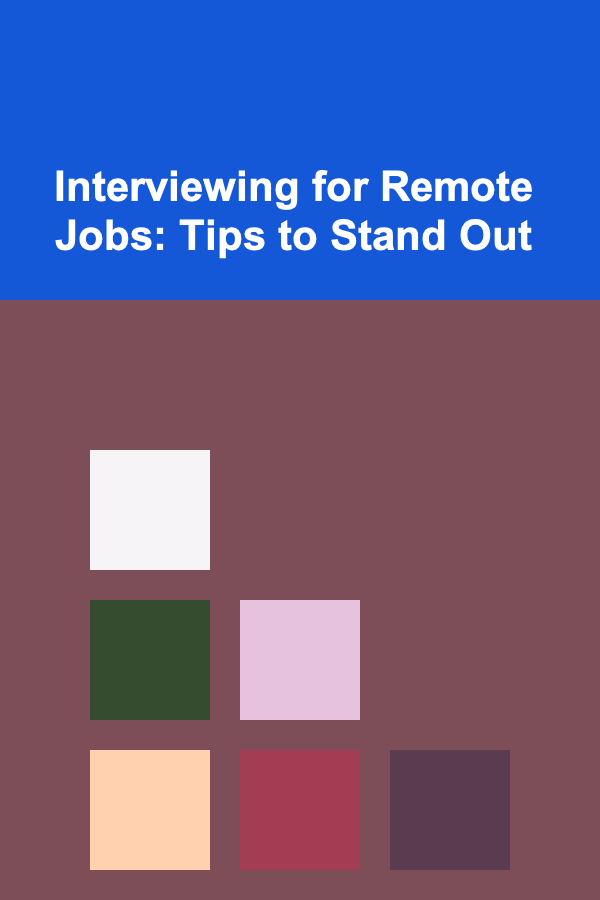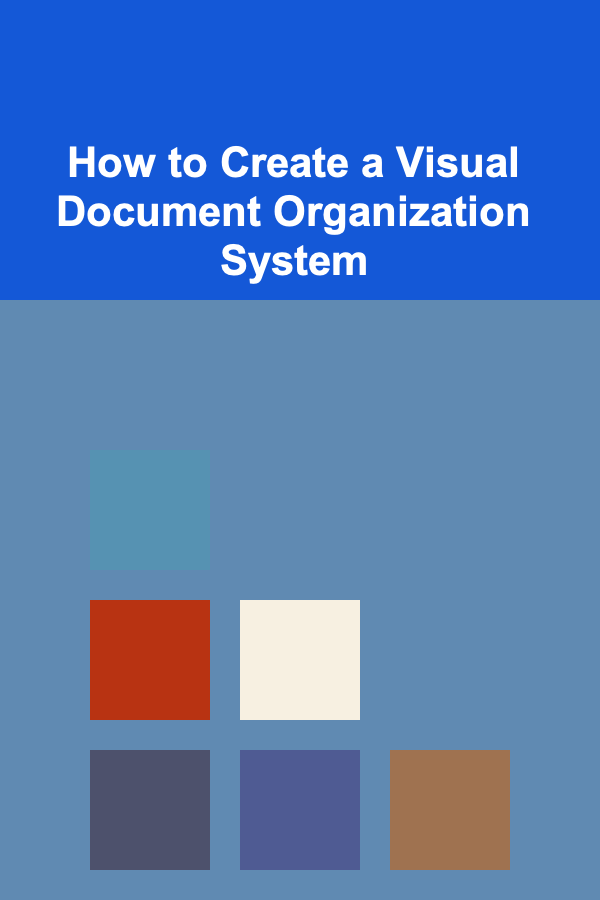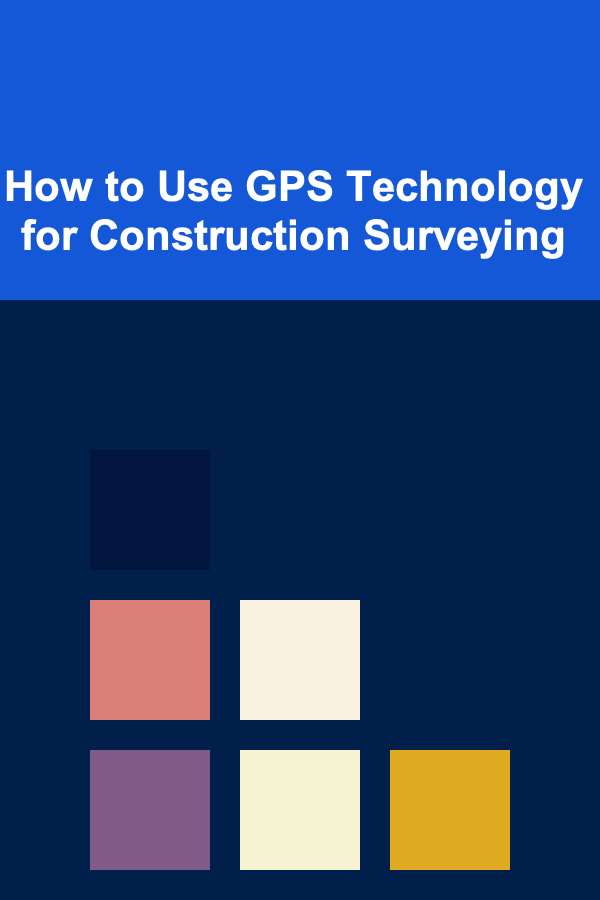
Interviewing for Remote Jobs: Tips to Stand Out
ebook include PDF & Audio bundle (Micro Guide)
$12.99$7.99
Limited Time Offer! Order within the next:

As remote work becomes increasingly popular, many candidates are vying for positions that allow them to work from anywhere. While remote job opportunities offer a variety of benefits, the competition can be fierce. With countless applicants from around the world, standing out during a remote job interview requires not only technical expertise but also the ability to demonstrate qualities that make you an ideal remote worker. In this guide, we'll explore actionable tips and strategies to help you stand out in your next remote job interview, ensuring that you highlight the skills and traits employers value most in remote employees.
Optimize Your Online Presence
Before you even get the interview, your online presence will play a crucial role in making a strong first impression. Remote employers often conduct their hiring process through virtual platforms, so they'll check your digital footprint. Your LinkedIn profile, resume, and even your social media accounts are all part of the story that potential employers will review. It's essential to make sure these profiles are polished, professional, and in line with the job you're applying for.
Actionable Steps:
- Update Your LinkedIn Profile: Ensure that your LinkedIn profile reflects your most recent work experience, skills, and any relevant remote work experience. Include recommendations from colleagues and supervisors that speak to your ability to work independently.
- Polish Your Resume: Tailor your resume to highlight skills that are important for remote work, such as communication, time management, and self-motivation. Consider including a section that emphasizes your experience working remotely or managing projects remotely.
- Showcase Remote Work Skills: If you've worked remotely before, make sure to mention specific tools you've used (e.g., Zoom, Slack, Trello) and any measurable outcomes you've achieved while working remotely. For instance, mention how your communication style improved, or how you helped streamline virtual team meetings.
- Professional Social Media Accounts: Keep your social media professional. If you have a public profile on platforms like Twitter, ensure that it aligns with the image you want to present as a remote professional.
Master the Virtual Interview Process
Remote job interviews are primarily conducted via video conferencing tools such as Zoom, Google Meet, or Microsoft Teams. While this format may feel more comfortable than an in-person interview, it comes with unique challenges. Ensuring that you are prepared for the virtual interview process will help you present yourself confidently.
Actionable Steps:
- Test Your Technology: Before the interview, test your internet connection, camera, and microphone. Use a reliable platform and make sure your software is up to date. Technical difficulties during the interview can leave a bad impression.
- Set Up a Professional Environment: Choose a quiet, well-lit space where you won't be interrupted. Ensure your background is tidy and free from distractions. A neutral background or a simple, professional backdrop is ideal.
- Dress the Part: Even though you're interviewing from home, dress as though you were meeting in person. This shows that you take the interview seriously and are ready to engage professionally.
- Use Eye Contact and Body Language: In a video interview, maintaining eye contact and using positive body language can be challenging, but it's important to keep your attention on the camera rather than the screen to simulate eye contact.
Highlight Your Remote Work Skills
Employers looking for remote workers often seek specific skills that make candidates successful in a virtual environment. These skills go beyond technical know-how and include traits such as communication, self-discipline, and time management. During your interview, make sure to emphasize these skills by sharing examples of how you've demonstrated them in past roles.
Actionable Steps:
- Effective Communication: Remote work relies heavily on clear communication. Be prepared to give examples of how you've effectively communicated with remote teams, handled complex conversations through email or video calls, and used collaboration tools (like Slack or Asana) to stay on the same page.
- Time Management and Autonomy: Working remotely requires a high level of self-discipline. Discuss how you prioritize tasks, set deadlines, and manage your time effectively without direct supervision. Show how you've met deadlines and achieved targets while working remotely or independently.
- Problem-Solving and Initiative: Remote workers are often expected to solve problems on their own, so share examples of situations where you took initiative to address challenges or improve processes, even when no one was directly overseeing you.
- Collaboration and Teamwork: Even though remote work is often solo, collaboration remains essential. Talk about your experience working with cross-functional teams virtually, demonstrating how you've navigated time zone differences, worked in collaborative tools, and ensured team success despite geographical distance.
Demonstrate Your Adaptability
Remote work requires flexibility. Whether it's adjusting to different time zones, working with diverse teams, or learning new software tools, remote employees need to be able to adapt quickly and effectively. During the interview, you need to show that you're not only capable of handling change but that you thrive in dynamic, evolving work environments.
Actionable Steps:
- Share Examples of Flexibility: Talk about times when you had to quickly adapt to new tools, technologies, or workflows in remote settings. Mention specific instances where you had to adjust your approach to meet a new challenge, such as switching to a new collaboration platform or working with international teams.
- Highlight Your Problem-Solving Abilities: Show how you can manage unexpected challenges, whether it's a technical issue or a shift in priorities. Employers value remote workers who can navigate issues without requiring constant direction.
- Emphasize Cultural Competence: If you've worked with global teams or across different time zones, mention your ability to navigate cultural differences and work harmoniously with colleagues from diverse backgrounds. Being open to new perspectives and embracing diverse ways of working is crucial for remote roles.
Be Ready to Discuss Remote Work Tools and Technologies
One of the advantages of remote work is the ability to use a wide array of tools that enhance productivity and streamline collaboration. Being familiar with these tools is crucial, as it shows that you are capable of hitting the ground running without requiring much onboarding.
Actionable Steps:
- Learn the Tools : Familiarize yourself with remote collaboration tools like Slack, Zoom, Microsoft Teams, Google Drive, Trello, Asana, and project management software like Jira or Monday.com. Even if you haven't used them all, knowing the basics will help.
- Mention Tools You've Used: During the interview, mention any relevant tools you've used in your previous roles. If you've worked with a particular software or platform that the company uses, it's helpful to bring that up.
- Showcase Tech Savviness: Remote jobs often require troubleshooting on your own, whether it's fixing a software glitch or resolving connection issues. Discuss how you are comfortable using technology to solve problems and keep things running smoothly.
Ask the Right Questions
At the end of every interview, you'll likely be given the opportunity to ask questions. Asking thoughtful, relevant questions demonstrates your interest in the role and company, while also allowing you to evaluate whether the remote job is a good fit for you.
Actionable Steps:
- Inquire About Team Structure: Ask about the team dynamics and how the company fosters collaboration among remote workers. This shows that you're considering how you'd fit into the company culture.
- Ask About Remote Work Culture: Inquire about how the company supports its remote employees. You might ask about communication practices, virtual team-building activities, or how the company ensures remote workers feel connected.
- Clarify Expectations: Ask about the specific expectations for remote workers, including work hours, deliverables, and communication protocols. This helps you better understand what will be expected of you and how you can succeed in the role.
- Discuss Career Development: Remote jobs can sometimes feel isolating, so asking about growth opportunities shows that you're thinking long-term and are committed to developing your skills within the company.
Follow Up with a Personalized Thank-You Note
After the interview, always send a thank-you note. This is a critical final step in the interview process, as it demonstrates professionalism and gratitude. A thoughtful follow-up also gives you the opportunity to reiterate why you're the best candidate for the job.
Actionable Steps:
- Personalize the Note: Reference specific moments from the interview that resonated with you. For instance, if the interviewer spoke about the company's remote work culture, mention how excited you are about the opportunity to be part of that environment.
- Reaffirm Your Suitability: Briefly reiterate why you believe you're a great fit for the role, especially highlighting your remote work experience and key skills.
- Keep It Concise: While a thank-you note should be thoughtful, keep it concise and professional. Ensure that your message is polite, clear, and free from errors.
Conclusion
Standing out in a remote job interview requires more than just technical expertise---it involves demonstrating your ability to communicate effectively, manage your time independently, and adapt to an ever-changing work environment. By focusing on your remote work skills, showcasing your familiarity with remote tools, and preparing thoughtfully for the virtual interview process, you can present yourself as a strong candidate for the role. With the right preparation and a proactive approach, you'll increase your chances of landing your dream remote job.
Reading More From Our Other Websites
- [Organization Tip 101] How to Use Review and Rating Systems for Book Recommendations
- [Personal Investment 101] How to Use Dollar-Cost Averaging to Your Advantage
- [Home Budget Decorating 101] How to Craft a Gallery Wall Cheaply: Beyond Prints -- Exploring Found Objects & DIY Art
- [Home Maintenance 101] How to Take Care of Your Home's Insulation for Energy Efficiency
- [Screen Printing Tip 101] Choosing the Right Ink and Mesh: Mastering Color & Detail in T-Shirt Prints
- [Personal Finance Management 101] How to Learn from Financial Mistakes for Future Success
- [Personal Investment 101] How to Find Small-Cap Stocks With Strong Fundamentals: A Screening and Analysis Process
- [Mindful Eating Tip 101] Best Ways to Use Mindful Eating to Transition from a Processed‑Food Diet to Whole Foods
- [Home Security 101] How to Protect Your Home from Break-ins on a Budget
- [Hiking with Kids Tip 101] Trail Sign Treasure Hunt: Engaging Activities to Help Kids Master Outdoor Navigation

How to Create a Visual Document Organization System
Read More
How to Incorporate Multi-Functional Furniture in Your Bedroom
Read More
How to Maintain a Minimalist Home Cleaning Routine
Read More
How to Master Social Media for B2B Marketing
Read More
How to Build a Portfolio Website with Tailwind CSS
Read More
How to Use GPS Technology for Construction Surveying
Read MoreOther Products

How to Create a Visual Document Organization System
Read More
How to Incorporate Multi-Functional Furniture in Your Bedroom
Read More
How to Maintain a Minimalist Home Cleaning Routine
Read More
How to Master Social Media for B2B Marketing
Read More
How to Build a Portfolio Website with Tailwind CSS
Read More